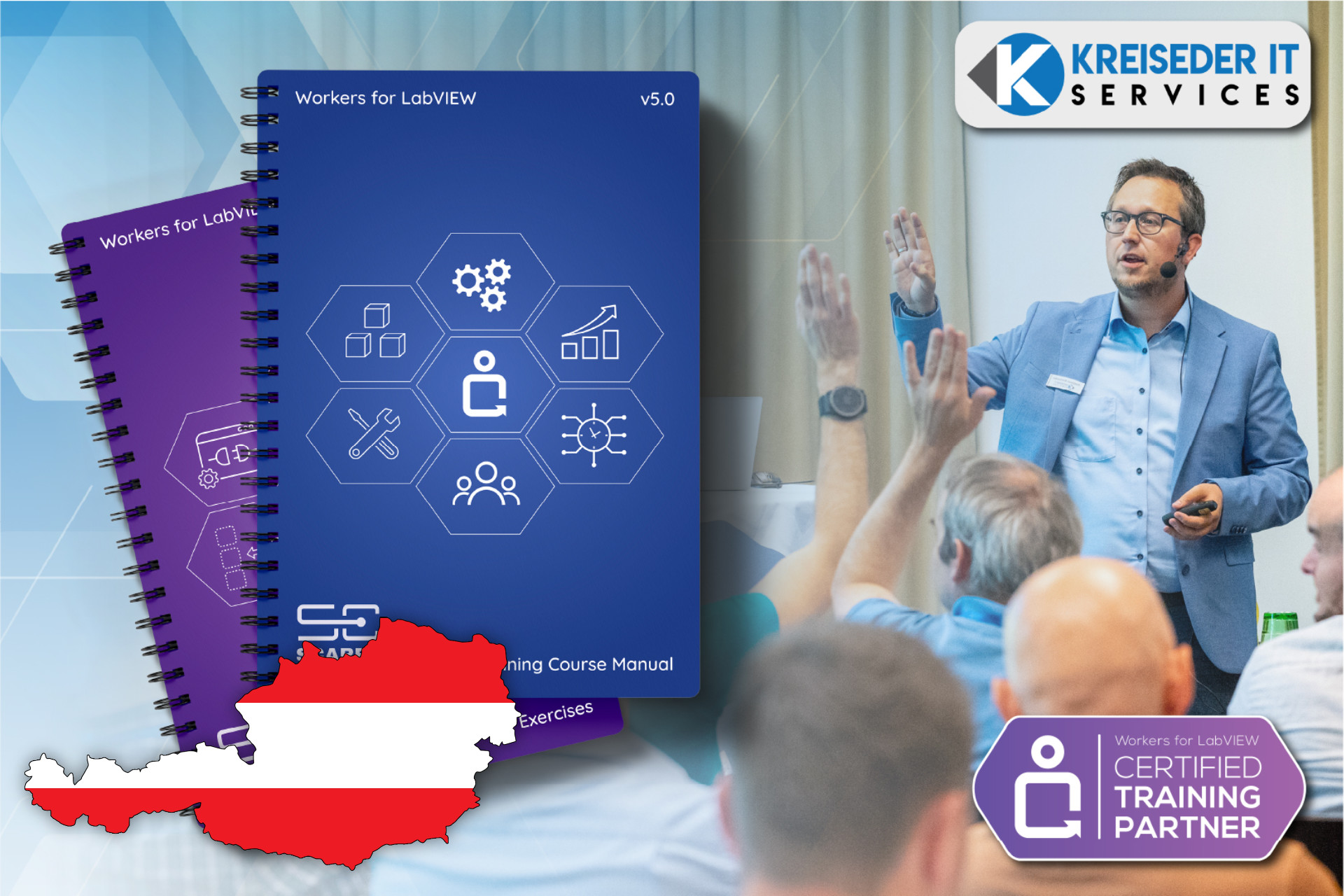
Workers for LabVIEW Training
Welcome to the official Workers for LabVIEW Training Course. This course will guide you through the fundamental concepts of the framework, equipping you with the knowledge to develop modular, scalable, and maintainable LabVIEW applications.
Course Description
The course consists of a conceptual manual and 12 hands-on exercises that build progressively on one another. Each exercise demonstrates the practical application of key concepts discussed in the manual.
The course is divided into two main parts:
1️⃣ Part 1: Basics and Fundamentals
This section introduces the Workers for LabVIEW framework, focusing on its four design pillars and the role of Workers and their components. You will learn:
- How to combine multiple Workers to form a multi-process, asynchronous LabVIEW application.
- How to create and use Local and Public APIs to facilitate communication between Workers.
- How to utilize core development tools, including the Workers Debug Server.
Note: LabVIEW Object-Oriented Programming (LVOOP) is not covered in detail in this section. However, by the end of Part 1, you will be able to develop multi-process, QMH-based LabVIEW applications in a scalable and modular way—sufficient for many real-world projects.
2️⃣ Part 2: Advanced LVOOP Features
Building on the foundations from Part 1, this section explores the LVOOP capabilities of the framework and demonstrates how they can enhance application development. Topics include:
- Class inheritance and overriding framework API VIs.
- Creating and using Worker base classes.
- Extending and overriding base class Message Handling Loop (MHL) cases.
- Developing Public API abstractions for Workers, enabling the creation of Hardware Abstraction Layers (HALs).
Note: Prior LVOOP experience is not required, but familiarity with object-oriented programming concepts will help. Basic LVOOP concepts will be introduced as needed, and further independent learning is encouraged to deepen your understanding.
Course Goals
Upon completion of this course, you will be able to:
✅ Understand the Workers for LabVIEW framework and its four design pillars, enabling you to develop modular, scalable, and maintainable LabVIEW applications using the QMH design pattern.
✅ Design and implement multi-process LabVIEW applications by combining multiple Workers into a hierarchical structure and enabling asynchronous priority-based communication.
✅ Create Local and Public Worker APIs to ensure a modular, decoupled architecture, allowing for reusable Worker modules that can be shared across projects.
✅ Leverage LVOOP features, such as inheritance, abstraction, and dynamic dispatch, to minimize code duplication, maintain a clean architecture, and develop HAL-based API abstractions.
✅ Utilize the Workers Debug Server to monitor, debug, and troubleshoot applications in real-time using the Application Manager and Message Logs.
✅ Employ the framework’s scripted tools to automate Worker creation, visualize Worker call-chain hierarchies, and modify Worker properties using QuickDrop shortcuts.
✅ Apply best practices for scalable architectures, using hierarchical structures, loose coupling, and plug-in capabilities to improve flexibility and reliability.
✅ Gain hands-on experience through guided exercises and learn how to create Public Worker APIs that can be called from external LabVIEW code or from applications such as NI TestStand.
Course Prerequisites
It is recommended that participants have a basic understanding of LabVIEW development, including concepts covered in:
- LabVIEW Fundamentals, LabVIEW Advanced, or…
- …experience developing applications using the QMH design pattern
Prior knowledge of LVOOP is not required but will be beneficial. Familiarity with object-oriented concepts will help optimize your development experience with the framework.
Included in the price are course materials, refreshments during breaks, drinks, lunch, and a certificate of participation. This is a 3-day training course held at a hotel. This training format offers a very high level of effectiveness, as we work in small groups with a maximum of 10 participants, allowing for intensive support.
The individual chapters are developed together and reinforced through programming exercises. The course language and materials are in English. Onsite courses can also be offered in German upon request. If you have any questions or need further information, please feel free to contact us.
To receive a quote, please send your details (number of participants, preferred dates) to office@kreiseder.org or call us at +436609181849.